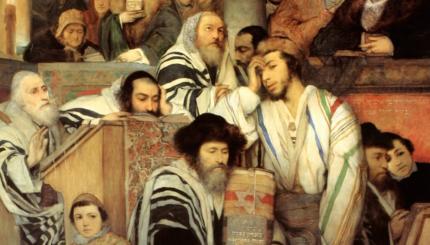Should we pray for happiness? On the face it, of course we should. Who doesn’t want to be happy?
But something about word “happiness” strikes Jews in the wrong way. There’s the old joke about the Jewish telegram: “Start worrying…details to follow.” Our default is often guilt rather than happiness. It is as if we have been programmed to see anxiety around every corner, to be more comfortable in the familiar “oy” over the risky “joy.”
Happiness is also an odd English word. It comes from the Middle English hap, as in happenstance and haphazard. This origin suggests that a happy life is a result of randomness and luck. Prayer has nothing to do with it.
In our consumerist culture, happiness is also frequently confused with pleasure, and praying for pleasure can feel self-indulgent. But happiness and pleasure are different.

Help us keep Jewish knowledge accessible to millions of people around the world.
Your donation to My Jewish Learning fuels endless journeys of Jewish discovery. With your help, My Jewish Learning can continue to provide nonstop opportunities for learning, connection and growth.
Pleasure is short-term, like getting a massage or eating a sumptuous meal. Happiness is long-lasting. It is flourishing, which is a word preferred by the founder of the scientific study of happiness, Professor Martin Seligman. According to Seligman, flourishing contains five key components: positive emotion, engagement, relationship, meaning, and accomplishment. An easy way to remember them is the acronym PERMA.
The Jewish happiness prayer, as we will see below, promotes flourishing. It is the happiness experienced through a life of meaning and purpose.
What is the happiness prayer? It is a series of verses from the we recite as part of the morning worship service. It is found in many prayer books as part of the traditional series of morning blessings.
The prayer begins with the words Eilu Devarim (“These are the Words”). The Hebrew word devarim also means actions or deeds. So the happiness prayer is a series of words describing actions that promote happiness.
Read the text of the prayer in Hebrew here.
The prayer contains ten actions in total, which I have translated as follows:
These are the deeds with infinite benefits.
A person enjoys their fruit in this world,
and in the world to come. Guide me in embracing these sacred practices:
Honor those who gave me life
Practice kindness
Learn Constantly
Invite others into my home
Be there when others need me
Celebrate life’s sacred moments
Support others during times of loss
Pray with intention
Forgive those who hurt me and seek forgiveness where I have others
Commit to constant growth.
This translation is not literal. For a few of the practices, I chose to convey the value expressed in the specific practice itself. For example, the Hebrew phrase that literally means “provide for a bride” I have rendered as “celebrating life’s sacred moments.” Providing for a bride reflects the importance of marking sacred moments with ritual, and these moments are not limited to weddings. Today they include anniversaries, baby namings, even graduations. Finding ways to participate in and create communal celebrations around those life events makes us happier.
The academic discipline of positive psychology has reinforced the message of the happiness prayer. Indeed, even though the rabbis who wrote this prayer were not familiar with positive psychology, their teachings intuit it. The actions this prayer calls upon us to take fit squarely within the PERMA framework noted earlier.
For example, celebrating life’s sacred moments incorporates positive emotions, relationships, and meaning. Praying with intention is a act of engagement, and prayer itself encompasses a worldview that life has meaning. Knowing how to pray — the words, the rhythm, the melodies — gives us a feeling of accomplishment. When we look at the Eilu Devarim prayer as a guide to happiness, we can see each of its practices as an expression of some aspect of PERMA.
Saying the prayer also promotes happiness in other ways. First, it pushes us outside of ourselves. Almost all of the ten practices involve other people. Inviting others into our lives, practicing kindness, and comforting mourners, are just the most direct examples. The rabbis understood the seeming paradox that focusing on others more than ourselves makes us happier. As Victor Frankl put, “the door to happiness opens outward.”
Frankl’s observation helps us see a second source of happiness in this prayer. It roots us in a religious worldview. Its opening verses remind us that we are reading more than a list of good deeds. They are a series of practices that echo through eternity. We feel their effects in this world and in the world to come.
Put differently, embracing a religious worldview makes us happier. We can speculate on why this is true. But I suspect part of the reason is that faith is a mindset that pushes us — in some cases, even obliges us — to do things that may not feel great in the short term, but that enhance our lives in the long term. These are the things we do that we can look back on a year later and feel happy to have done.
Every year, I fast on Yom Kippur, the Jewish Day of Atonement. To do so is a commandment found in the Torah and has been a Jewish tradition for more than 4,000 years. Since I am working all day — delivering sermons and leading my congregation in eight hours of prayer — fasting is the last thing I want to do. Yet it enhances my experience of the day and my connection to others. It does not feel pleasurable in the moment. But when I look back, I know I experienced the power of the day.
This is the kind of commitment faith has always nurtured, and ignoring the role of faith in the search for happiness is like going to search for a treasure and throwing away an old map leading directly to it. The Eilu Devarim prayer is such a map. May it guide us on our journey.
Rabbi Evan Moffic is the spiritual leader of Congregation Solel in Highland Park, IL. He is the author of the “The Happiness Prayer: Ancient Jewish Wisdom for the Best Way to Live Today.”



